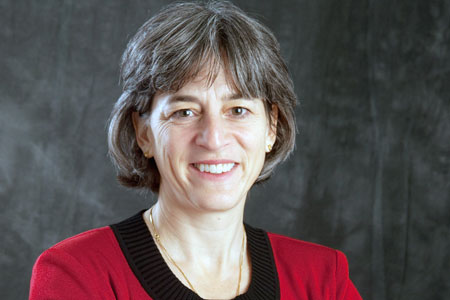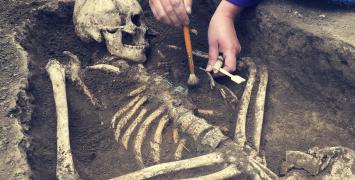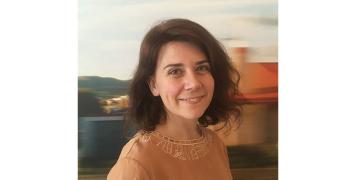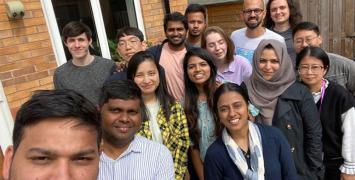
What is your work about?
At the very beginning of my career, I wanted to become a Physical Education teacher and coach. This is how I became fascinated with human physiology and understanding how the body adapts to exercise training.
I am now a scientist dealing with understanding the pathogenesis of Type II diabetes. My team and I are studying how diet and exercise affect the sensitivity of organs like skeletal muscles to the hormone insulin. We perform research that focuses on diabetes prevention at a molecular level.
My point of view is that it is important to understand how a person who has diabetes can improve their lifestyle. In this respect it's important for me to be coupled with clinical research, so that I am dealing with individuals who actually have the disease, and I can follow their progression from patient to cells, to try and dissect some of the mechanisms of insulin resistance and how we can reprogram them with exercise.
How did you end up doing this work in Sweden?
I moved to Sweden for my PhD. I was following the field of muscle exercise physiology and biochemistry throughout my masters and undergraduate studies. I worked in St Louis at Washington School of Medicine and a lot of the work we were following in the literature was inspired by the Scandinavian scientists, so I guess that's where I wanted to study. I followed the science to Sweden. Then I moved back to the US to do a postdoc at Harvard Medical School.
The reason I came back to Europe is that there was such a great working relationship between the clinical investigators and the basic biologists. They really encouraged the model of staying close to the patient and letting the physiology raise the questions to study. This kind of translational approach, where you're working bench to bedside or bedside to bench, is really strong in Scandinavia.
I came back to Europe in 1996, and since 2010, I am also working part-time at the University of Copenhagen. I think Scandinavian scientists come together, with their uniqueness, focusing on patient centric ethos and collaboration. I've been really privileged to stay here and work at both institutions. I think, in general, this is characteristic around Europe; that Europeans are very collaborative, and this is certainly an added value of doing research here.
You have also been an ERC grantee, at what point did this grant arrive?
I am of the opinion that any grant you get always arrives at the right time. I got an ERC grant about 10 years ago. This gave me a specific, relatively long, period of time with sustained and substantial funding. Basically, it provided some intellectual freedom to dive deeper into some of the problems we had been working on in the lab. I think that is an incredible opportunity for a scientist. It allowed us to go into new areas, like studies of epigenetics and how environment can influence our genome and help restore skeletal muscle insulin sensitivity. The funding helped us get somewhere that we probably wouldn't have reached before, because we would have been too confined.
You have moved between the US and Europe for most of your career. Why do you think this is important?
My view is that, as a scientist, you are expected to do something of value. It's not enough to be the most excellent person in Stockholm, or Sweden, one has to strive to raise the level of excellence worldwide. We are, after all, citizens of the world.
When we evaluate Nobel Prize candidates, for example, of course we are really looking for an individual that has made a discovery of a paradigm shifting nature, benefitting human kind. But most of the scientists that are pushing the edges of new discovery are people who are involved in the global scientific pursuit at some level or another. If their discovery is of any great height, it is something that other people around the world are aware of.
I think it is important to all individuals who care about science to communicate about science around the world and collaborate to enlarge the knowledge base, hopefully to make the world a better place. It helps you expand your horizons and see in a different light the problems you are struggling with within your own lab. You really need to get out in the world, share ideas and get out of your bubble.

Juleen R. Zierath is Professor of Physiology at the Karolinska Institutet, in Sweden. She is also a Professor of Integrative Physiology at the University of Copenhagen, Denmark. She heads research labs, directs foundations, all while identifying future Nobel Laureates. Most of all, she tries to understand how moving our body can helps us stay healthy, in particular to improve the lives of diabetes patients. She is also a lifelong athlete, with her love for exercise leading her from training as a Physical Education teacher in her native US to moving to Sweden and becoming a scientist.
Prof. Zierath also recently won a Nordic Medicine Prize:
Honored to receive the Nordic Medicine Prize today together with Patrik Rorsman for our work on Diabetes! #diabetes #islets #muscle #exercise pic.twitter.com/PzZG00Y8Gn
— Juleen R. Zierath (@JuleenRZierath) 28 gennaio 2019
Interview with Juleen R. Zierath and fellow scientist Lydia Lynch
Listen to the reasons for their returns and the role played by the ERC funding in these decisions. This episodes originally featured in the Nature Research Custom Media’s Working Scientist podcast.





